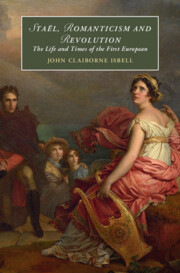Book contents
- Staël, Romanticism and Revolution
- Cambridge Studies in Romanticism
- Staël, Romanticism and Revolution
- Copyright page
- Epigraph
- Contents
- Preface
- Acknowledgments
- Abbreviations
- Introduction
- Chapter 1 The Painful Birth of the Romantic Heroine
- Chapter 2 Revolution and the Private Sphere
- Chapter 3 Madame de Staël, Minister for War?
- Chapter 4 The Social Contract for Staël and Constant, or Does Liberty Have a Sex?
- Chapter 5 When the Light of Reason Fails
- Chapter 6 Imaginary Europe
- Chapter 7 Suicide, Meaning, and Power in the Querelle of Delphine
- Chapter 8 My Father, Myself
- Chapter 9 Italy, or Corinne
- Chapter 10 Interlude
- Chapter 11 Napoleon Pulps His Enemies
- Chapter 12 The Napoleon Apocalypse
- Chapter 13 Romantic Spain and National Resistance
- Chapter 14 A. W. Schlegel, Staël, and Sismondi in 1814
- Chapter 15 The Italian Romantics and Madame de Staël
- Chapter 16 Inventing the French Revolution
- Chapter 17 Voices Lost?
- Conclusion
- Notes
- Select Bibliography
- Index
- Cambridge Studies in Romanticism
Chapter 9 - Italy, or Corinne
Published online by Cambridge University Press: 03 August 2023
- Staël, Romanticism and Revolution
- Cambridge Studies in Romanticism
- Staël, Romanticism and Revolution
- Copyright page
- Epigraph
- Contents
- Preface
- Acknowledgments
- Abbreviations
- Introduction
- Chapter 1 The Painful Birth of the Romantic Heroine
- Chapter 2 Revolution and the Private Sphere
- Chapter 3 Madame de Staël, Minister for War?
- Chapter 4 The Social Contract for Staël and Constant, or Does Liberty Have a Sex?
- Chapter 5 When the Light of Reason Fails
- Chapter 6 Imaginary Europe
- Chapter 7 Suicide, Meaning, and Power in the Querelle of Delphine
- Chapter 8 My Father, Myself
- Chapter 9 Italy, or Corinne
- Chapter 10 Interlude
- Chapter 11 Napoleon Pulps His Enemies
- Chapter 12 The Napoleon Apocalypse
- Chapter 13 Romantic Spain and National Resistance
- Chapter 14 A. W. Schlegel, Staël, and Sismondi in 1814
- Chapter 15 The Italian Romantics and Madame de Staël
- Chapter 16 Inventing the French Revolution
- Chapter 17 Voices Lost?
- Conclusion
- Notes
- Select Bibliography
- Index
- Cambridge Studies in Romanticism
Summary
Chapter 9 argues that Staël saw a Faustian bargain in Corinne ou l’Italie, took it, and paid the price; its triumphs and failures thus stand or fall together. What Staël gained was mythic power; what she lost was the ability to control its fate. Corinne’s political impact in Europe and America, standing as it does at the birth of modern nationalism, is both real and unquantifiable – witness the coinage nationalité, part of the larger impact of Staël’s ideas on national genius, reflected in Blackwood’s praise of her in 1818 as the creator of the science of nations. The novel’s esthetic impact on a century of readers is both fascinating and somewhat easier to assess, an invitation to future study already made in 1825 by Stendhal in a remark from Racine et Shakespeare: “Je ne vois réellement que Corinne qui ait acquis une gloire impérissable sans se modeler sur les anciens.”
- Type
- Chapter
- Information
- Staël, Romanticism and RevolutionThe Life and Times of the First European, pp. 89 - 99Publisher: Cambridge University PressPrint publication year: 2023

